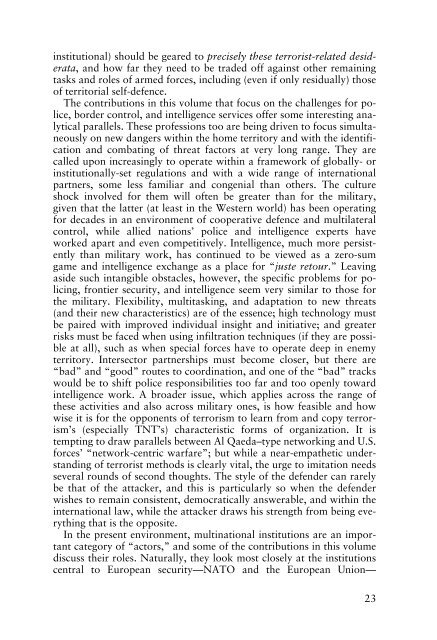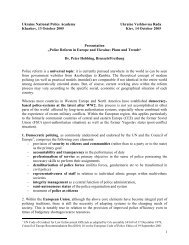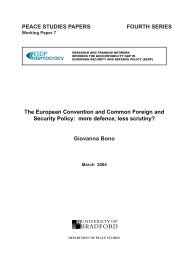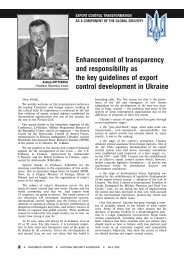combating terrorism and its implications for the security sector - DCAF
combating terrorism and its implications for the security sector - DCAF
combating terrorism and its implications for the security sector - DCAF
You also want an ePaper? Increase the reach of your titles
YUMPU automatically turns print PDFs into web optimized ePapers that Google loves.
institutional) should be geared to precisely <strong>the</strong>se terrorist-related desiderata,<br />
<strong>and</strong> how far <strong>the</strong>y need to be traded off against o<strong>the</strong>r remaining<br />
tasks <strong>and</strong> roles of armed <strong>for</strong>ces, including (even if only residually) those<br />
of territorial self-defence.<br />
The contributions in this volume that focus on <strong>the</strong> challenges <strong>for</strong> police,<br />
border control, <strong>and</strong> intelligence services offer some interesting analytical<br />
parallels. These professions too are being driven to focus simultaneously<br />
on new dangers within <strong>the</strong> home territory <strong>and</strong> with <strong>the</strong> identification<br />
<strong>and</strong> <strong>combating</strong> of threat factors at very long range. They are<br />
called upon increasingly to operate within a framework of globally- or<br />
institutionally-set regulations <strong>and</strong> with a wide range of international<br />
partners, some less familiar <strong>and</strong> congenial than o<strong>the</strong>rs. The culture<br />
shock involved <strong>for</strong> <strong>the</strong>m will often be greater than <strong>for</strong> <strong>the</strong> military,<br />
given that <strong>the</strong> latter (at least in <strong>the</strong> Western world) has been operating<br />
<strong>for</strong> decades in an environment of cooperative defence <strong>and</strong> multilateral<br />
control, while allied nations’ police <strong>and</strong> intelligence experts have<br />
worked apart <strong>and</strong> even competitively. Intelligence, much more persistently<br />
than military work, has continued to be viewed as a zero-sum<br />
game <strong>and</strong> intelligence exchange as a place <strong>for</strong> “juste retour.” Leaving<br />
aside such intangible obstacles, however, <strong>the</strong> specific problems <strong>for</strong> policing,<br />
frontier <strong>security</strong>, <strong>and</strong> intelligence seem very similar to those <strong>for</strong><br />
<strong>the</strong> military. Flexibility, multitasking, <strong>and</strong> adaptation to new threats<br />
(<strong>and</strong> <strong>the</strong>ir new characteristics) are of <strong>the</strong> essence; high technology must<br />
be paired with improved individual insight <strong>and</strong> initiative; <strong>and</strong> greater<br />
risks must be faced when using infiltration techniques (if <strong>the</strong>y are possible<br />
at all), such as when special <strong>for</strong>ces have to operate deep in enemy<br />
territory. Inter<strong>sector</strong> partnerships must become closer, but <strong>the</strong>re are<br />
“bad” <strong>and</strong> “good” routes to coordination, <strong>and</strong> one of <strong>the</strong> “bad” tracks<br />
would be to shift police responsibilities too far <strong>and</strong> too openly toward<br />
intelligence work. A broader issue, which applies across <strong>the</strong> range of<br />
<strong>the</strong>se activities <strong>and</strong> also across military ones, is how feasible <strong>and</strong> how<br />
wise it is <strong>for</strong> <strong>the</strong> opponents of <strong>terrorism</strong> to learn from <strong>and</strong> copy <strong>terrorism</strong>’s<br />
(especially TNT’s) characteristic <strong>for</strong>ms of organization. It is<br />
tempting to draw parallels between Al Qaeda–type networking <strong>and</strong> U.S.<br />
<strong>for</strong>ces’ “network-centric warfare”; but while a near-empa<strong>the</strong>tic underst<strong>and</strong>ing<br />
of terrorist methods is clearly vital, <strong>the</strong> urge to imitation needs<br />
several rounds of second thoughts. The style of <strong>the</strong> defender can rarely<br />
be that of <strong>the</strong> attacker, <strong>and</strong> this is particularly so when <strong>the</strong> defender<br />
wishes to remain consistent, democratically answerable, <strong>and</strong> within <strong>the</strong><br />
international law, while <strong>the</strong> attacker draws his strength from being everything<br />
that is <strong>the</strong> opposite.<br />
In <strong>the</strong> present environment, multinational institutions are an important<br />
category of “actors,” <strong>and</strong> some of <strong>the</strong> contributions in this volume<br />
discuss <strong>the</strong>ir roles. Naturally, <strong>the</strong>y look most closely at <strong>the</strong> institutions<br />
central to European <strong>security</strong>—NATO <strong>and</strong> <strong>the</strong> European Union—<br />
23

















